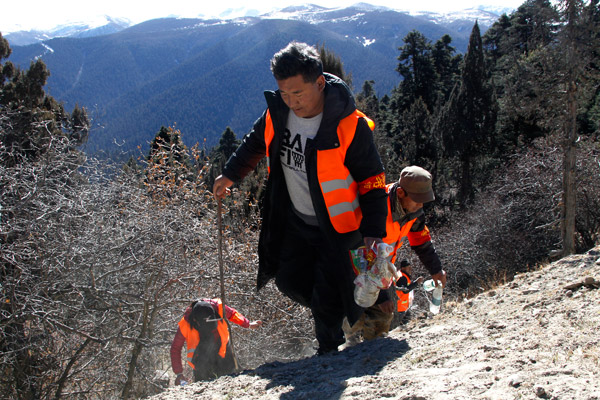From woodcutter to forest ranger


Norbu, a former woodcutter from Lulang in Nyingchi prefecture, Tibet autonomous region, never imagined he would become a forest ranger and own an inn offering bed and breakfast to tourists.
His new life is a far cry from the hard times he and his family endured years ago. "In the 1980s, I earned my living by cutting wood, but timber was a dime a dozen at the time, so it wasn't easy to make money," the 54-year-old said.
Norbu, who like many Tibetans only has one name, said the wood mostly sold for about 30 yuan ($4.60) per cubic meter, although it could fetch 70 yuan per cu m when demand was high.
"We took the transportation fees on ourselves if we carried the timber to Bayi, the prefecture's central area. The profit we made was woefully meager," he said. "It was hard to feed the family, and the mountain became bare because of excessive logging."
In 2007, Norbu found work as a forest ranger, earning 3,000 yuan a year.
Lulang, known across China as "the Switzerland of the East", is 80 kilometers from Bayi. It is famous for the Lulang Forest, ancient woodland that covers 15 sq km and boasts a wide variety of trees. In 2007, the city and the forest were placed under State-level protection to prevent illegal logging, safeguard the ecosystem and support the local economy.
The development of Lulang is listed as a key project in the development of tourism in Tibet as part of the region's poverty reduction program.
In 2012, the local government launched a resort called Lulang International Tourism Town, attracting investment of more than 3.5 billion yuan ($540 million) from the government of Guangdong province and businesses, including China Poly Group Corp, Evergrande Group and Guangdong Provincial Tourism Holding Co.
Its construction created more than 2,500 jobs for local residents, while B&B services and the manufacture and sale of souvenirs have been promoted since the resort opened in March.
Last year, Norbu opened a home inn near the resort, earning about 50,000 yuan in his first tourist season.
Lu Huadong, one of two deputy directors of the Tibet Leading Group Office of Poverty Alleviation, said the project helps both the people and the environment.
"Our development plan stresses environmental protection. Tibet is one of China's "green shields", so economic development and environmental protection are vital to our poverty alleviation work," he said.
- Earthquake strikes Guizhou county early morning
- A continued commitment to the people
- Jilin documentary festival brings filmmakers to northeastern China
- Shanghai's Global Taste festival kicks off with European season
- Warming of oceans still sets records
- China-Cambodia joint karst research gets UN pat



































